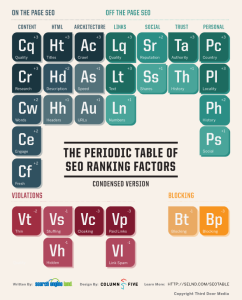
Search Engine Optimization — to some, it is a fine science, to others it seems like voodoo. Today, we are going to clear up a bit of the mystery.
SEO is not magic. Likewise, it is not a scam, although some who claim to be experts are scammers. SEO is actually strongly encouraged by search engines because it improves the quality of their results.
In short, it’s all about getting seen on the Internet. Let’s start off with Wikipedia’s definition of SEO:
Search engine optimization (SEO) is the process of improving the visibility of a website or a web page in search engines via the ‘natural’ or un-paid (‘organic’ or ‘algorithmic’) search results.
Notice the emphasis on “unpaid.” Paid search, on the other hand, refers to pay-per-click ads and sponsored listings within search results pages (SERPS).
There are a lot of things you can do to make your content sexier to Google without having to adopt black-hat tactics. One of my favorite illustrations of how SEO works is the “Periodic Table of SEO Ranking Factors,” created by the good folks over at Search Engine Land. It’s a well organized and simple way to present the basics, dividing the information into: On The Page Ranking Factors, Off The Page Ranking Factors, Violations, and Blocking.
On-the-page factors include things like content type, site architecture, and proper HTML code. Off-the-page factors include things like your website’s trust, reputation, and authority — mainly determined by the quality and quantity of inbound links to various pages on your website. Violations can (but don’t always) occur when you acquire inbound links to your site through practices that are against Google Webmaster Guidelines, such as buying links.
I find that infographics like this one make it a lot easier for most people to absorb data, and this is one of the best I know of on a subject that seems to perplex most people.
If you’d like to explore the many different individual factors that affect SEO, SEOmoz has a wonderful and comprehensive survey compiling “the aggregated opinions of dozens of the world’s best and brightest search marketers” on what factors have the most significant impact on organic search rankings. You can check out the 2011 SEOmoz Ranking Factors here. For those who haven’t been practicing SEO or studying statistics for years — like most people — Chris Crum at WebProNews provides a nice, less technical summary of the results.
Source: “Overview: The Periodic Table Of SEO Ranking Factors,” Search Engine Land
Source: “Search Engine Ranking Factors,” Search Engine Ranking Factors/SEOmoz, 2011
Image: The Periodic Table Of SEO Ranking Factors, used with permission.